

Save The Orangutan Indonesia - Habitat for Survival Project - Rainforest Rescue. ShareThis Rainforest Rescue’s Orangutan Habitat for Survival Project is working in partnership with the Orangutan Information Centre (OIC) in North Sumatra to save the Orangutan by restoring and protecting critical Orangutan habitat in the Gunung Leuser National Park .
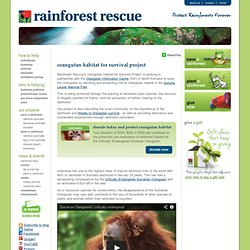
This is being achieved through the planting of rainforest plant species, the removal of illegally planted Oil Palms, and the prevention of further clearing of the rainforest. Our project is also educating the local community on the importance of the rainforest and threats to Orangutan survival , as well as providing alternative and sustainable employment through rainforest restoration. Illegal palm oil developments force monkeys to down tools. 16 August 2013Last updated at 09:05 ET By Matt McGrath Environment correspondent, BBC News The Burmese long-tailed macaque has developed the ability to use stone tools to crack open shellfish Macaque monkeys that have developed the ability to use stone tools to open shellfish are in danger of losing the skill because of human development.
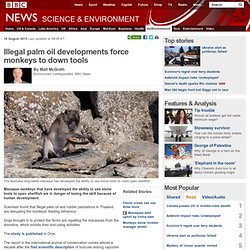
Scientists found that illegal palm oil and rubber plantations in Thailand are disrupting the monkeys' feeding behaviour. Cameroon’s chimps find themselves in palm oil’s firing line. US palm oil project would destroy endangered chimpanzee habitat in Cameroon. WEBWIRE – Thursday, August 08, 2013 Amsterdam – The endangered Chimpanzee stands to have swathes of its forest habitat in Cameroon destroyed if a US company’s controversial plans to establish a palm oil plantation in the area are not stopped.
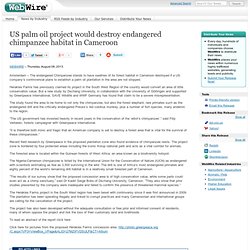
Herakles Farms has previously claimed its project in the South West Region of the country would convert an area of little conservation value. But a new study by Dschang University, in collaboration with the University of Göttingen and supported by Greenpeace International, SAVE Wildlife and WWF Germany has found that claim to be a severe misrepresentation. The study found the area to be home to not only the chimpanzee, but also the forest elephant, rare primates such as the endangered drill and the critically endangered Preuss’s red colobus monkey, plus a number of fish species, many endemic to the region.
Recent field research by Greenpeace in the proposed plantation zone also found evidence of chimpanzee nests. Related Links Source. Controversial News, Controversial Current Events. Author: Lou A, March 31, 2013.

English: Palm oil from Ghana with its natural dark color visible, 2 litres Español: Aceite de palma de Ghana con su color oscuro natural, 2 litros (Photo credit: Wikipedia) [Note: images in this article are disturbing] Are you guilty? I’m definitely an animal lover, but not an extreme animal activist: I am not vegan, nor vegetarian (aside from a brief dalliance as a child after watching ‘Babe’, proudly, for around a year and a half) as I love meat too much (and yes, I confess I was broken by a BigMac….), and I wear leather (perhaps naively assuming this is a by product of the red meat I’m eating), but I AM in favour of sustainable and cruelty free products. I do not support the fur trade, which I think is a diabolical excuse for fashion, nor do I buy eggs that are from battery hens. Do you eat biscuits? Save the Orangutan - Stop Palm Oil. Palm oil: All day, every day, NOT OK. SAY NO TO PALM OIL. Certified Sustainable Palm Oil (CSPO) CSPO represents the certification process where palm oil growers must commit to real credible sustainability standards through time-bound plans.
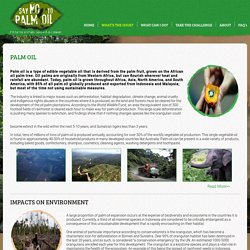
There is an increasing demand for palm oil that is sustainably certified in Europe and North America, including big names such as Walmart, Unilever and Nestle. As of 2011, CSPO represented over 10% of the global palm oil market but this has increased in recent years and is projected to increase in coming years. The certification process consists of reviewing existing production operations and identifying areas that must be improved to reach the CSPO standards to then be approved by a certification body.
The standards are based on eight principles which have been retrieved from the RSPO website: 1. 2. 3. 4. 5. 6. 7. 8. SAY NO TO PALM OIL. SAY NO TO PALM OIL. 'Palmed Off': Is Your Dinner Killing Orangutans? When I found Max, he couldn’t walk.
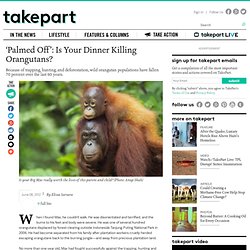
He was disorientated and terrified, and the burns to his feet and body were severe. He was one of several hundred orangutans displaced by forest clearing outside Indonesia’s Tanjung Puting National Park in 2006. He had become separated from his family after plantation workers cruelly herded escaping orangutans back to the burning jungle—and away from precious plantation land. No more than one year old, Max had fought successfully against the trapping, hunting and forest clearing industries that endangered his short life. But with one last breath, he finally lost his battle, becoming one of several thousand orangutans killed annually by a barbaric agricultural farming process, and becoming a victim of a different kind of oil spill: the trade in palm oil.
Palm oil monoculture is “palming” off orangutans in giant numbers, pushing the once abundant species closer than ever to extinction. These same scientists predict the species could be extinct by 2023. M.O.M. - Missing Orangutan Mothers 2012 Campaign Video (Baby Orangutan Bonanza!)